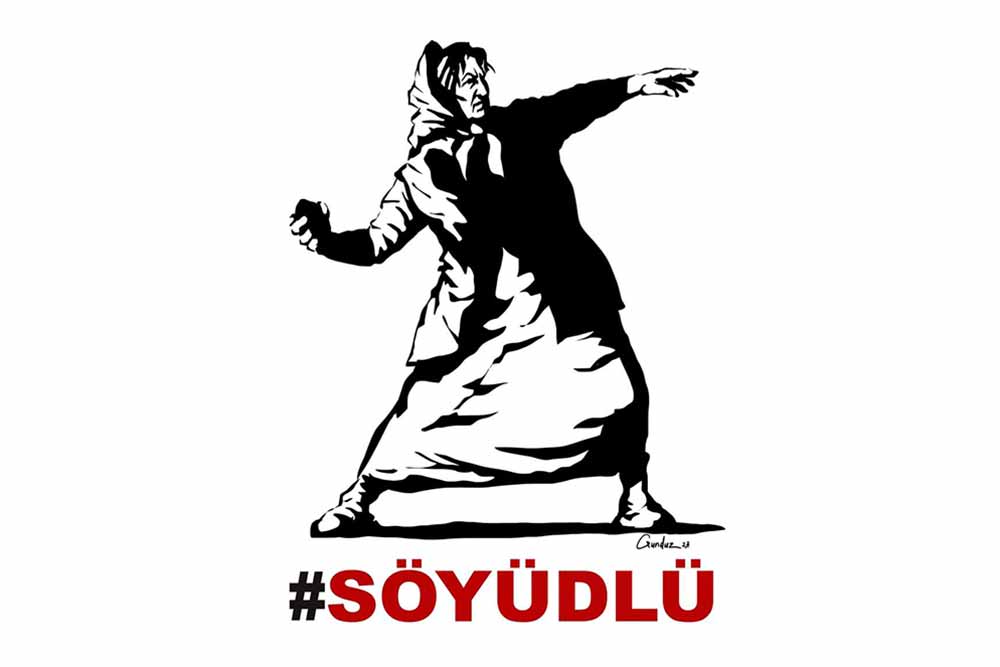Azerbaijani Authorities Crack Down on Eco Protests
Villagers demand end to construction of a second reservoir for a local gold mine.
Azerbaijani Authorities Crack Down on Eco Protests
Villagers demand end to construction of a second reservoir for a local gold mine.
Tension remains high in the village of Soyudluin in western Azerbaijan following a heavy-handed response to protests against the construction of a reservoir intended to hold waste from a gold mine.
On June 20, law enforcement officers confronted a group of villagers, mostly elderly women. Videos shared on social media showed riot police and armed security forces spraying tear gas at close range at demonstrators and firing rubber bullets.
Holding signs with slogans such as “The future generation is growing up sick,” and “The voice of nature is not heard because nature is dying,” the villagers aimed to draw attention to the local environmental crisis. Of particular concern is the pollution of the river Kür, the name in Azerbaijani of the Kura, the east-flowing river south of the Greater Caucasus Mountains which flows into the Caspian Sea.
Residents warn that the discharge of waste materials into the lake leads to the release of harmful acids into the area, wreaking havoc upon the delicate local ecology. Health consequences include eye and lung diseases, including cancer. Far from assuaging villagers’ concerns, the proposed construction of another lake, located amidst the village’s precious pastureland, has only served to intensify them.
Sugra, one of the 2,300 residents of the village, claimed that the current situation has rendered the entire area toxic, making it virtually impossible for people to leave their homes.
“The smell permeates every corner, causing significant distress and posing severe health risks… Sleeping at home has become difficult due to the unbearable smell,” the 71 year-old told IWPR.
The nearby Gadabay gold mine is owned by US-based Anglo-Asian Mining, which holds rights in eight areas in Azerbaijan to extract gold, copper, and silver. In the past, Anglo-Asian Mining faced scrutiny for its connections to President Ilham Aliyev's family.
The issue of the reservoir and the mining pollution have attracted the attention of eco-activists. Kenan Khalilzade, of the Azerbaijani environmental NGO Ecofront, said that during his three-day stay in the village, he could not stand the smell of the cyanide and he could not sleep, as “the stench was indeed terrible”.
“The last day, as there was a barricade around the village, I used the river side to go to the lake to get a water sample, but I was stopped by the police and the laboratory sample taken from the water was confiscated,” the 26-year-old told IWPR.
Given the ecological damage already caused by the construction of the first lake by the village, Khalilzade agrees with the villagers’ concerns.
“Such a development will have widespread negative consequences. Cyanide, a key component in the mining process, poses significant risks to the environment,” he stated. “The villagers are right to be concerned, as they fear that life in the vicinity of these lakes will become untenable.”
Police spokesman Elshad Hajiyev told reporters that the presence of police posts at the village entrance preventing access to non-residents would be temporary. He said that they would be removed once a commission created by Prime Minister Ali Asadov to oversee operations in Soyudlu concluded its work.
Sympathy for the villagers’ plight has spread. On June 23, three feminist Azerbaijani activists organised a protest to support the villagers at the event that the US Embassy had organised to mark Independence Day. However, they were expelled by embassy employees, handed over to the police and temporarily detained before being released.

The activists - Narmin Shahmarzade, Gulnara Mehdiyeva and Sanubar Heydarova - held signs that depicted a black hand to the throat, seeking to raise awareness about events in Soyudlu and urging officials and opposition representatives to address the situation.
“People in Soyudlu have been fighting for survival and the state is trying to suppress their voices, restricting their access to the village, beating and arresting them,” Shahmarzade told IWPR. “Our journalist friends have been subjected to violence while trying to cover these issues.”
In a written comment, the US embassy told IWPR that “only portions of the official programme were open to the media and on the record,” adding that “the US embassy supports fundamental freedoms including the right to protest and freedom of speech”.
On July 2, activists held a solidarity rally in the central Fountain Square of Baku, calling for the halt of construction on a second cyanide lake in the village, the restoration of entrance and exit points, the release of those detained, and the punishment of the police officers involved in acts of violence.
This time, the police allowed the demonstration to proceed without interference.
LACK OF TRUST
Villagers are sceptical about the government’s willingness to act, given the lack of tangible results from previous promises or actions. Moreover, they argue that the commission is run by the same individuals who initiated the reservoir’s construction.
“There is an overwhelming lack of trust in official statements claiming that no new lake will be established,” Sugra said, adding that the villagers were not seeking financial compensation from the government, but rather want the contaminated lake closed and the creation of any future toxic bodies of water prevented.
A lack of consultation and engagement has made matters much worse. Villagers recount how officials came and conducted investigations and wrote reports, but they have been left in the dark about the contents and outcomes of these actions.
Despite their efforts to reach out to influential figures, including the ruling Aliyev family, the villagers have received no response to pleas for assistance.
“Feeling unheard, we were compelled to mobilise and raise our voices in the hope of garnering support,” one woman told IWPR anonymously. “Those responsible for creating the issue are now responsible for addressing it.”
Meanwhile, residents complain that the police presence leaves them feeling powerless.

One female resident told IWPR that Gadabay’s executive allegedly instructed the police to forcefully silence any women who dared to speak out, emphasising a directive to “pack them all in jail”.
“The intimidation tactics employed by the police have instilled fear within the community,” the 68 year-old woman said, asking to remain anonymous.
“The heavy police presence extends in and around the village,” she continued. “Even when we want to go to the provincial centre, we encounter checkpoints. Police officers are everywhere, at every 100 metres in the village. I have never seen anything like this in my life. You tell me what our sin is, except demanding our rights.”
The arrests of young men, including those who merely sought to purchase medicine for their children, have further exacerbated tensions. So far ten residents of the village have been detained. No evidence has been presented to justify these detentions.
“Our plea is simple,” the woman continued. “We seek an end to this prevailing mistreatment. We want our basic right to be fulfilled - living a dignified life.”
This publication was prepared under the "Amplify, Verify, Engage (AVE) Project" implemented with the financial support of the Ministry of Foreign Affairs, Norway.
